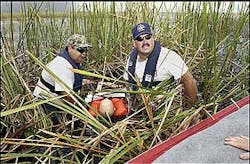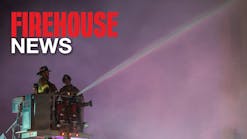Florida Fire-rescue Crew Tries to Bring Civilization to Remote Stretch of Alligator Alley
Fire rescue Lt. Fred North is a hard-charging paramedic with 25 years on the job, a "call-jumper" who thrives on adrenalin and thought he knew Broward County.
Then the Fort Lauderdale native took a post at Station 106, which opened in March mainly to put rescuers closer to the desolate stretch of Interstate 75 known as Alligator Alley.
He learned he didn't even know half the county.
For every Broward acre of dry land clogged with houses and cars and emergencies waiting to happen, there are almost two acres of Everglades.
The station, equipped with a $65,000, double-prop airboat ambulance, is providing emergency service to an area once accessible primarily by helicopter.
"My perception was that there was nothing out there but grass and water and alligators," said North, a burly man with a firefighter's hallmark mustache. "That's the farthest from the truth."
Broward's 787 square miles of swampy, undulating grassland is traversed by thousands of airboats and dotted with almost 80 camps, dry islands with permanent cottages that range from one-room shacks to sprawling lodges with air conditioning, garages and enough bunks to sleep 20.
Since March, the 106 has had six rescue runs, including pulling a critically injured man from a downed helicopter and saving four people waist-deep in muck on a June night after they waited two hours to call for help while their cell phone dried out.
Between rescue calls, the nine firefighters on regular rotation at the station near Mile Marker 35 are trying to formalize ambulance service for an area where there are no road signs or street addresses.
"There is nothing but GPS (global positioning system) coordinates out there," North said.
That means long days in the airboat buzzing through flies as big as quarters with a remote-control-sized GPS device, noting the latitude and longitude of each camp. One plan, rescue workers said, is to find funding for signs to post at each oasis, marking the camp name and its GPS coordinates. Then, if a wayward fisherman stumbles onto a camp, he can call for help and say exactly where he is.
The firefighters are also mapping the jumble of trails that cut through the sawgrass, tracking the nameless paths and major trails with names such as Holiday, Government and East-West. They are feeding the data into a computer program to create their own rescue guide to Broward's backcountry.
Before Station 106 was built, there were two options for Everglades rescue missions: a medic jumping from a hovering helicopter, or having a private airboat operator take rescuers to the scene.
"I used to sit on the banks and wait for somebody to come pick me up," said Mitch Stewart, 50, a firefighter who pilots the new airboat. "That's a sickening feeling when somebody is dying. ... It's like having a bunch of medics standing on the side of the road."
In the past, civilians also tried to aid the injured.
Randy Meeker, who stays "busier than a three-legged cat" running an airboat charter service, remembers taking an epileptic who forgot his medication and had a seizure seven miles to shore. In 2003, a Davie man died from stab wounds when friends couldn't get him to land fast enough for medical attention.
The new airboat is stocked with advanced life-support systems, including electrocardiogram monitors, airway bags and special tie-downs to secure patients on backboards to the deck.
But more than the fancy equipment, the new station is stocked with medics who grew up in the Everglades.
Stewart, a ubiquitous weekender at the camps, knows most regulars by their nicknames.
"Duke," Stewart said of Roy Williams, another firefighter stationed at 106, "that guy was born in the Everglades. He's been out here 40 years."
North is the exception.
"I'll tell you, I was a city boy before this," said North, who spent his last nine years in Pompano Beach running 13 calls a day in a district that was just five square miles.
His first day working in the Everglades, Stewart stopped the airboat in the middle of the muck and was told to get off.
"I said, `Get off where? It's not dry,'" a sunburnt North recalled.
He now knows that the alligators scatter, snakes keep their distance and the swarms of finger-sized dragonflies are actually good because they gulp enough annoying bugs to earn the nickname "mosquito hawks."
"It was an uncertain transition for me because my comfort zone has always been running calls in the city," North said.
Stewart grinned and had a quick rejoinder.
"Now we can't get him out of the woods."






